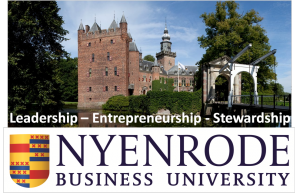 In April 2017, three recent graduates of Nyenrode Business University jointly presented the key highlights on their sustainability-focused master’s theses. With stewardship as one of Nyenrode’s core values, it’s great to see students research and explore such sustainable topics.
In April 2017, three recent graduates of Nyenrode Business University jointly presented the key highlights on their sustainability-focused master’s theses. With stewardship as one of Nyenrode’s core values, it’s great to see students research and explore such sustainable topics.
Value chain transparency and customer engagement to attract new customers
Marjolein Bakker focused on attracting new customers for sustainable products. Her research focused on the role of disruptive innovation in creating sustainable value propositions. Through interviews and desk research, she found that besides innovation, value chain transparency and customer engagement were also important factors to make sustainable products successful.
focused on attracting new customers for sustainable products. Her research focused on the role of disruptive innovation in creating sustainable value propositions. Through interviews and desk research, she found that besides innovation, value chain transparency and customer engagement were also important factors to make sustainable products successful.
Total cost of ownership to fuel innovation
 Peter van Wingen is fascinated by the juxtapositions in the food industry. How is it possible that over 25% of the world population has insufficient access to sufficient nutrition, while one-third of food production goes to waste and 25% of the world’s population overeats? His personal mantra is that “innovation sets the world free from the limitations it has put on itself“. Yet through desk research, he concluded that for propositions to be truly sustainable, disruptive innovation is not enough. A proposition needs to take the total cost of ownership into consideration. This elevates the purpose of the business to a higher societal level and adopts a stewardship role, which is not only more sustainable but can also be very inspiring.
Peter van Wingen is fascinated by the juxtapositions in the food industry. How is it possible that over 25% of the world population has insufficient access to sufficient nutrition, while one-third of food production goes to waste and 25% of the world’s population overeats? His personal mantra is that “innovation sets the world free from the limitations it has put on itself“. Yet through desk research, he concluded that for propositions to be truly sustainable, disruptive innovation is not enough. A proposition needs to take the total cost of ownership into consideration. This elevates the purpose of the business to a higher societal level and adopts a stewardship role, which is not only more sustainable but can also be very inspiring.
Strategic orientation toward sustainability to drive capabilities and performance
 Nicolette Zalesky researched how a company’s strategic orientation and motivation towards corporate social impacts its sustainability performance. She matched pairs of Euronext-100 companies from the same industry; one with a more stewardship approach and one with a more instrumental approach to sustainability. Through interviews and desk research, she assessed their sustainability performance and the underlying drivers.
Nicolette Zalesky researched how a company’s strategic orientation and motivation towards corporate social impacts its sustainability performance. She matched pairs of Euronext-100 companies from the same industry; one with a more stewardship approach and one with a more instrumental approach to sustainability. Through interviews and desk research, she assessed their sustainability performance and the underlying drivers.
In the companies with a stewardship approach, sustainability is more embedded in the company culture and related decisions are made at every level of the organization. These companies emphasize knowledge creation and are more likely to partner with external stakeholders. In companies with a more instrumental approach, she found that sustainability is seen as a tool and related decisions are taken at the top. Often, KPIs are in place and results are monitored, but these are less likely to be analyzed for improvements. In conclusion, she suggests that the strategic orientation to sustainability seems to drive the dynamic capabilities and knowledge management, which in turn drive the sustainability performance of a company.
I much enjoyed hearing from these recent graduates on what they had learned at Nyenrode and from their research. I look forward to following them in their careers. And to learning more from future Nyenrode and other students on their sustainability-related research.
Written by Marjolein Baghuis (@mbaghuis). To read about interesting people, book reviews and other posts about sustainability, change, and communications please subscribe to the Change in Context blog.
